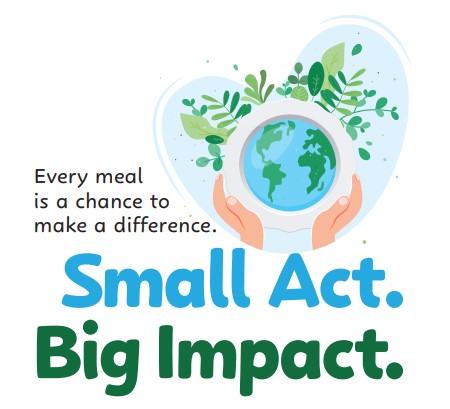Climate-Conscious Dining
Every Day Climate Choice
Small Act. Big Impact.
Every meal is a chance to make a difference.

The Initiative: Climate-Conscious Dining
UMass Dining is more than award-winning food. While we’re proud to be ranked the #1 college dining program by the Princeton Review for eight years in a row, our mission extends beyond accolades. We are committed to:
- Providing exceptional dining experiences that are flavorful, nutritious, and convenient
- Supporting sustainability and responsible sourcing
- Empowering our community to make informed, climate-conscious choices
Our next step? Bringing transparency and traceability to our menus—so you can make dining choices that align with your values and impact the planet in a positive way.
The Initiative: Climate-Conscious Dining
Your food choices impact the planet.
About one-third of all human-caused greenhouse gas emissions come from food production, but not all foods have the same carbon footprint. For example,
beef produces 7.2x greater emissions than chicken—swapping it out for just one meal can nearly halve your carbon footprint for a day!
At UMass Dining, we’re making climate-conscious dining simple and easy with our Carbon Rating System.
Look for our climate footprint icon on menus and choose lower-carbon meals with confidence.





The Initiative: Climate-Conscious Dining
The Carbon Rating System, powered by My Emissions,
calculates the kgCO2e (carbon emissions per kg of product) for every menu item.
This Life Cycle Assessment factors in:
- Farming methods
- Processing and production
- Transportation distances
- Packaging impact
| Carbon Intensity (kgCO₂e / kg product) | Carbon Rating |
| 0 – 1.75 | A / Very Low |
| 1.75 – 3 | B / Low |
| 3 – 4.25 | C / Medium |
| 4.25 – 5.5 | D / High |
| 5.5+ | E / Very high |
Why It Matters: The Impact of Your Food Choices
The U.S. food system accounts for 20% of national greenhouse gas emissions.
Animal-based foods generally have a higher carbon footprint than plant-based alternatives. Over 75% of UMass students believe their food choices impact the environment and want sustainable options.
By making simple, informed choices—such as swapping high-impact ingredients for lower-carbon alternatives—you can contribute to real climate action every day


Making Low-Carbon Dining Easy
We recognize that students want practical ways to reduce their environmental impact. That’s why our chefs are:
- Creatively utilizing low-carbon foods like tofu, nuts, vegetables, and legumes
- Minimizing high-carbon ingredients like beef, lamb, cheese, and chocolate
- Offering plant-forward meals daily in all dining commons
Plus, we’re prioritizing local, seasonal ingredients to further reduce food miles and emissions




Take Action: Choose Climate-Smart Meals
- Look for the green footprint icon on our menus
- Choose A or B-rated meals whenever possible
- Explore our daily menus online or on the UMass Dining app
- Want to learn more? Dive into the data behind our carbon ratings
Visit our partners to learn more and start making
climate-conscious choices today!
Our World in Data: Search – Our World in Data https://ourworldindata.org/search?q=Food
MyEmissions: https://myemissions.co/articles/food-carbon-labelling


A Brief History of Our Sustainability Efforts
(Graphic from 2023-24 from my emissions)
Fall 2021 – UMass Dining surveyed 800+ students:
- 75% wanted to reduce their food-related carbon footprint
- This drove the initiative to add carbon ratings to menus
Fall 2022 – UMass Dining became the first university dining program to launch an A-E Carbon Rating System in all four dining commons, in partnership with My Emissions.
Now, in 2025, we’re continuing to evolve. With our Climate-Conscious Dining initiative, we’re making sustainable choices more accessible, visible, and impactful than ever before.


